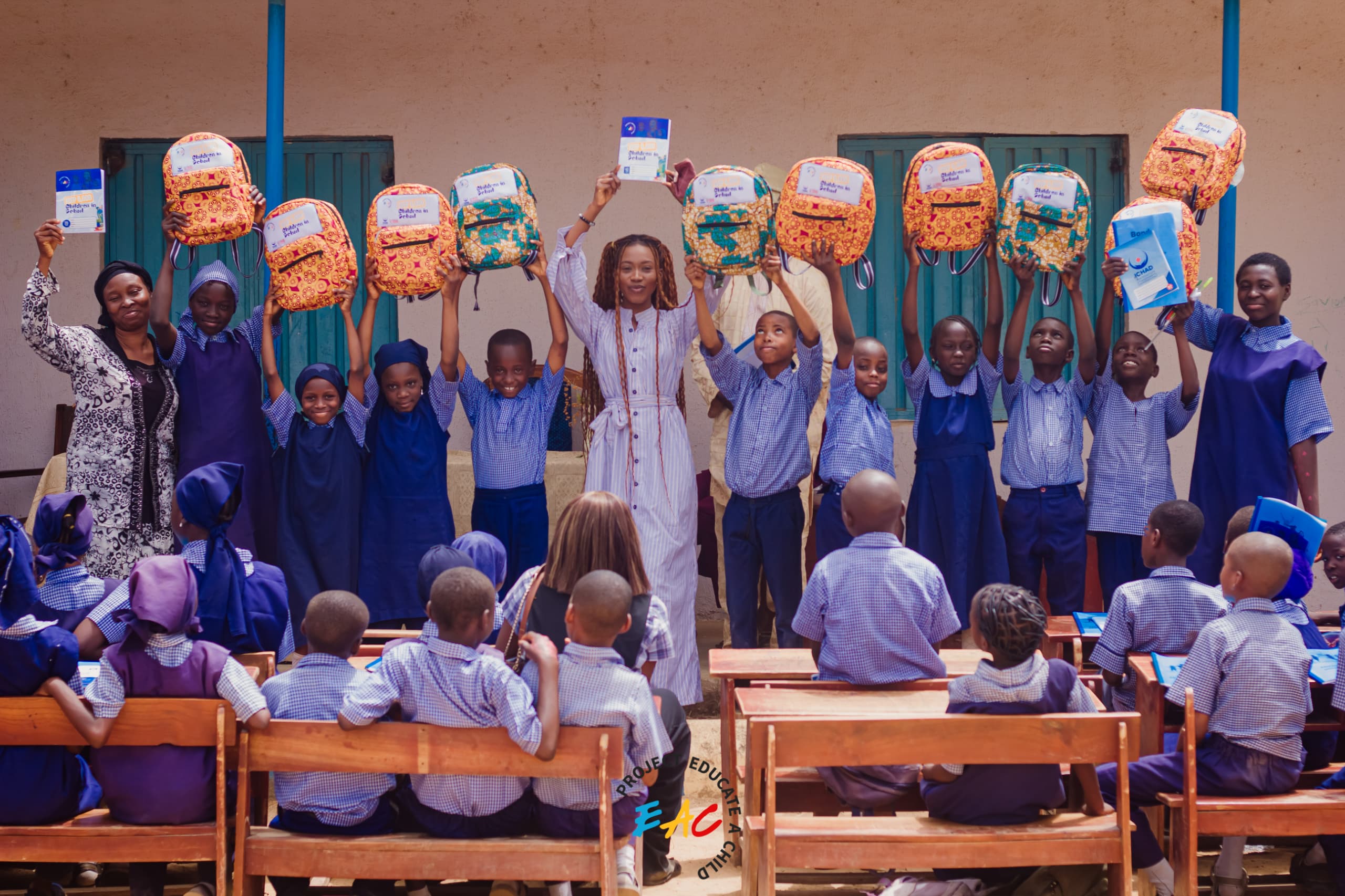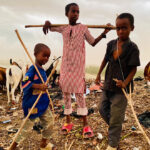“Growing up in Northern Nigeria, I witnessed firsthand the struggles some families faced to keep their children in school. It deeply touched me, and I felt compelled to make a difference. So, I decided to take action,” Seyi Bolaji noted.
In Africa, the challenges facing education are stark, prompting support for many underprivileged children in the region.
One of every five out-of-school children in the world resides in Nigeria, according to UNICEF. Although primary education remains free and mandatory, approximately 10.5 million of the country’s children aged 5-14 are not enrolled in school. Only 61 percent of 6-11 year-olds regularly attend primary school, with merely 35.6 percent of children aged 36-59 months having received early childhood education.
This educational crisis is more pressing in the northern part of the country, which has a net attendance rate of only 53%. The girl child bears more of the brunt, as the primary net attendance rates of females within the north-east and north-west is 47.7 percent and 47.3%, respectively.
This bleak reality promptly spurred Seyi Bolaji into action.
“In a part of the world where some children have access to quality education while others don’t, it is important to address the challenges they face. I strongly believe that every child, regardless of their background, should have the opportunity to learn and grow,” she explained.
Bolaji stated that her initiative aims to provide underprivileged children with the education they deserve, distributing textbooks, notebooks, school uniforms, pens, schoolbags, pencils and more.
“Over the years, I have been involved in various projects aimed at supporting education in Northern Nigeria. However, founding Project EAC was a turning point. It’s about providing support and encouragement to underprivileged children to stay in school and reach their full potential.”
About Project EAC
Project Educate a Child Campaign, or EAC, is a progressive initiative founded on March 4, 2020, with the mission of helping underprivileged children unleash their full potential through access to quality education. The initiative draws on a vision of a world where every child, regardless of their socio-economic background, has equal and boundless opportunities to receive quality education and thrive.
“It started as a personal project to mark my birthday in March. Since its inception in 2020, Project EAC has supported and provided for over 5,000 children in Northern Nigeria, where access to quality education remains a significant challenge,” she elaborated.
Project EAC had earlier conducted a Teens’ Leadership Series, inspiring teenagers with adequate leadership skills and establishing reading clubs in schools that fostered a love for learning. The initiative also collaborated with non-governmental organizations dealing with children, all with a small team of volunteers.
“Starting with about 10 volunteers, today we have over 30 volunteers who dedicate their time to promoting this cause without remuneration,” Bolaji said.
Among other projects the initiative has hosted are interactive sessions and creative activities for learners, social media campaigns to solicit support while spreading awareness, and educational webinars, among others.
Different Perspectives
A volunteer handling finance and distribution, Praise Ademola joined the initiative in 2021, for what has been a “fulfilling experience.”
“Unquestionably, Project EAC is driving change. I recall one of our distributions some time ago. Some students resolved that they would love to be able to cater to the needs of less privileged children in the future,” she said. “They wanted to be like us. We won’t take all the credit because many selfless individuals made this happen, but we are glad to be a channel. This project is not just about giving but shaping attitudes.”
Ademola believes that being intentional about a child’s education would significantly reduce the high statistics, suggesting that schools seek funding and grants to help children in general.
“For as long as the need exists and with God giving me strength, I hope to invest my skills truly and efficiently without holding back,” she stated.
Once Goodness Onu stumbled on a post about Project EAC on Seyi Bolaji’s Facebook page, he sent her a message asking if he could volunteer.
“The experience has been eye-opening. These are the words I would use to describe my experience so far. Through this, I have come to appreciate the importance of quality education. It is inspiring because I am always encouraged to make an impact in whatever way I can in my environment,” she expressed.
Onu looks forward to a future where Project EAC will become a major stakeholder in the educational sector, both in Nigeria and globally. A time when they will be able to provide a conducive system for people living with disabilities to have access to quality education as well.
“Personally, I have had the opportunity to develop my public speaking and teamwork skills. Being part of the debate, spelling bee, and sensitization unit of the initiative, I have had to speak and express my thoughts, sometimes without prior notice,” she added.
Bolaji and her team recognize the importance of collaboration in achieving their goals and welcome partnerships with individuals, corporations, and organizations that share their vision.
“In the past, we have collaborated with Stand with a Girl Initiative, or SWAG, ICHAD Foundation, Lina’s Dream Academy, and Stork Craft Learning System,” Bolaji said.
Limited funding
For a relatively nascent initiative like Project EAC, low funding remains the biggest challenge. Having initiated EAC as a personal project for her birthday, Bolaji depended on her salary to support the cause, with occasional assistance from family and friends.
“While we have made progress with increased support from individuals and a few organisations, the need for funds remains a major hurdle. With more financial resources, Project EAC could significantly amplify its impact,” she said.
The lack of sufficient funding for EAC has also cramped its reach, Bolaji said. Concentration has largely been focused on Kaduna State, neglecting the many rural communities across Nigeria that could benefit from its services. Bolaji believes that more money would help the initiative to incorporate more states across the north.
“Additionally, the quality of teachers in Northern Nigeria is a growing concern. Quality education hinges on competent educators, and we are committed to providing training and support for teachers to ensure that students receive the education they deserve,” Bolaji emphasized.
On March 4, Project EAC kicked off a campaign called “KEEP 5,000 CHILDREN IN SCHOOL,” spanning 2 months and cutting across various public schools in Kaduna State and parts of Nigeria.
“Our project’s multifacated approach encompasses a range of activities designed to engage, educate, and empower children and teenagers,” Bolaji added.
Despite the odds, Bolaji and her team remain resolute in their vision to bolster support for out-of- school children and rewrite the age-old stereotype in Northern Nigeria.
Seyi Bolaji has taken significant steps to address educational disparities in Northern Nigeria, where many children are out of school. Witnessing these struggles firsthand, Bolaji founded Project Educate a Child Campaign (EAC) on March 4, 2020, aiming to provide underprivileged children with essential educational resources such as textbooks, notebooks, and uniforms.
In Nigeria, about 10.5 million children aged 5-14 are not in school, with the situation particularly dire in the northern regions. Bolaji's initiative has already supported over 5,000 children, organized leadership training, and collaborated with NGOs to foster a love for learning.
Volunteers like Praise Ademola and Goodness Onu attest to the initiative's impact, emphasizing its role in shaping positive attitudes and developing skills among children. Despite facing challenges related to funding, Project EAC remains committed to expanding its reach and improving teacher quality in Northern Nigeria. Recent campaigns, including “KEEP 5,000 CHILDREN IN SCHOOL,” underline their dedication to making a lasting difference.






